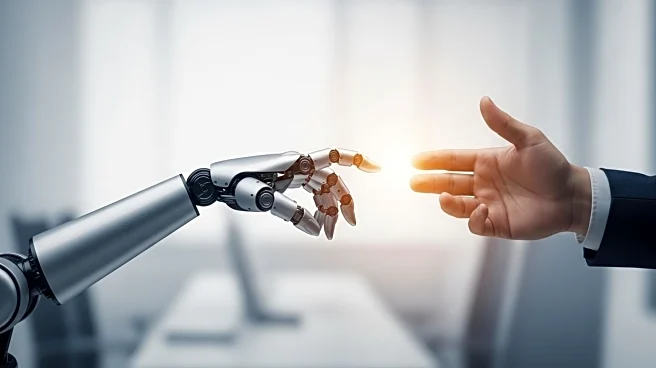What's Happening?
Walmart's CEO Doug McMillon has highlighted the transformative impact of artificial intelligence on jobs within the company and the broader U.S. workforce. During a conference at Walmart's headquarters in Bentonville, McMillon stated that AI would change every job, although the company's global headcount of 2.1 million is expected to remain stable over the next three years. Walmart is actively preparing its workforce for these changes by offering cutting-edge AI training through a collaboration with OpenAI, starting next year. The company has already integrated AI tools like Sparky, a GenAI-powered shopping assistant, and Wally, an internal tool for analyzing product performance. Despite the technological advancements, McMillon expressed a preference for human interaction over humanoid robots, emphasizing the importance of the human touch in customer service.
Why It's Important?
The integration of AI into Walmart's operations signifies a major shift in the retail industry, potentially affecting millions of jobs. As AI tools become more prevalent, they could lead to job displacement while simultaneously creating new opportunities requiring different skill sets. Walmart's proactive approach to training its employees for AI-related roles could serve as a model for other companies facing similar challenges. The emphasis on human interaction over robots highlights a strategic decision to maintain customer service quality, which could differentiate Walmart from competitors like Amazon and Target. This development underscores the broader trend of AI reshaping industries and the workforce, necessitating adaptation and retraining to meet new demands.
What's Next?
Walmart plans to roll out AI training for its U.S. store and office-based staff next year, preparing them for the evolving job landscape. The company will continue to monitor job trends to identify areas where additional training is needed. As AI tools become more integrated into operations, Walmart may explore further collaborations with tech companies to enhance its capabilities. The retail giant's focus on maintaining human interaction suggests it will continue to prioritize customer service, potentially influencing its strategic decisions and competitive positioning in the market.
Beyond the Headlines
Walmart's decision to prioritize human interaction over humanoid robots raises ethical considerations about the role of technology in society. The company's approach reflects a balance between technological advancement and preserving human jobs, which could influence public perception and consumer trust. As AI continues to evolve, businesses may face pressure to address ethical concerns related to job displacement and the impact on workers' livelihoods. Walmart's strategy could prompt discussions on the responsible use of AI and the importance of human-centric service in the digital age.










